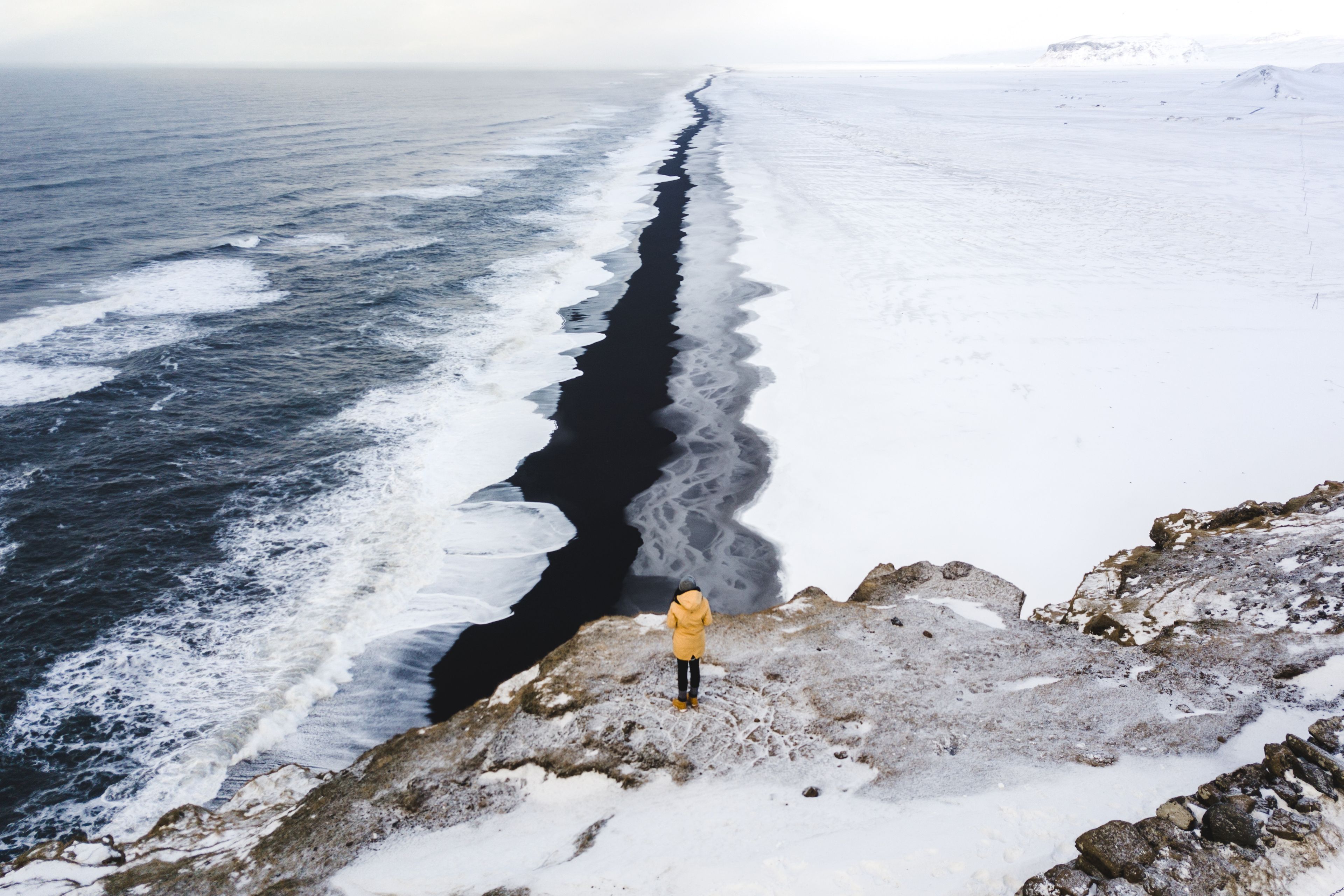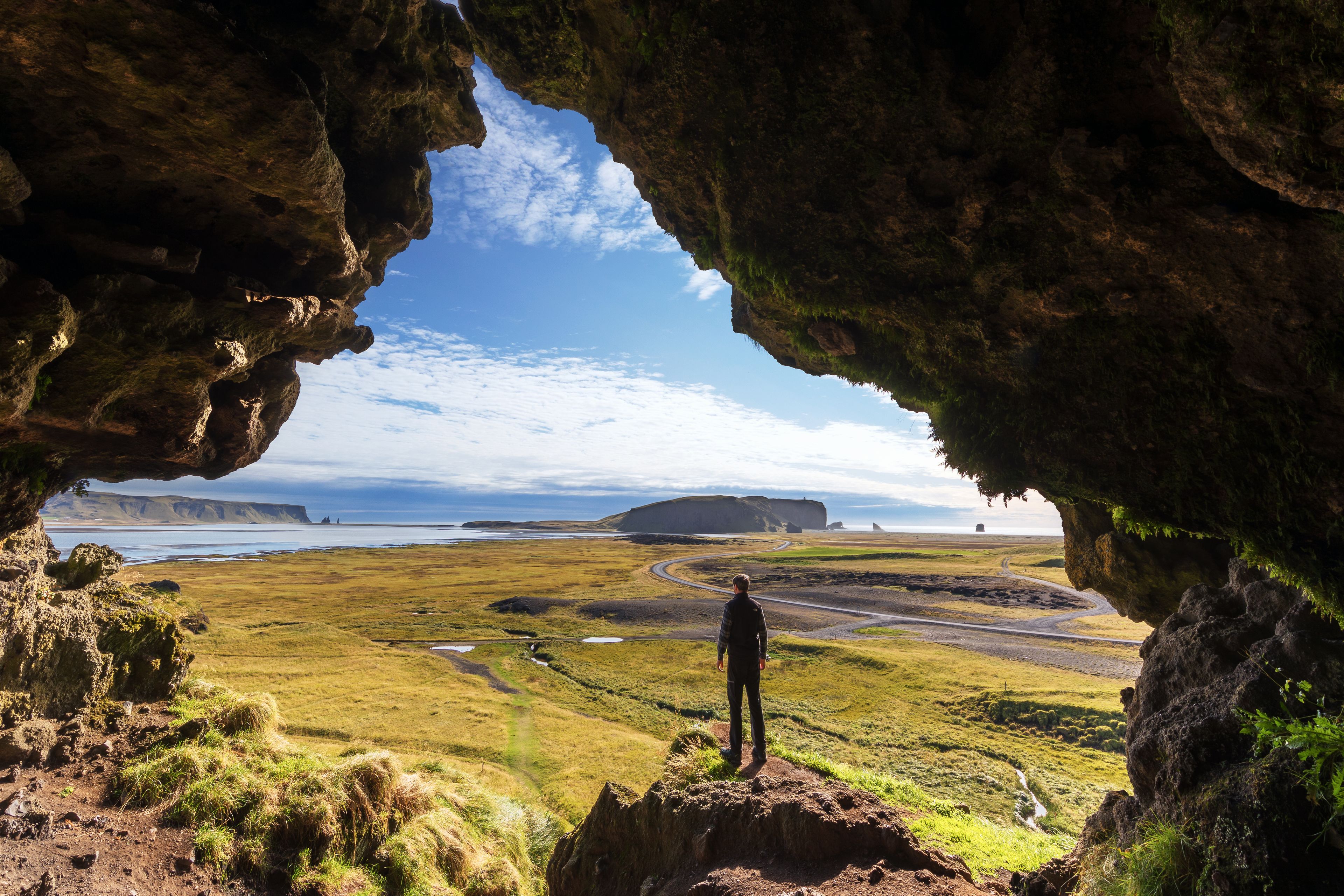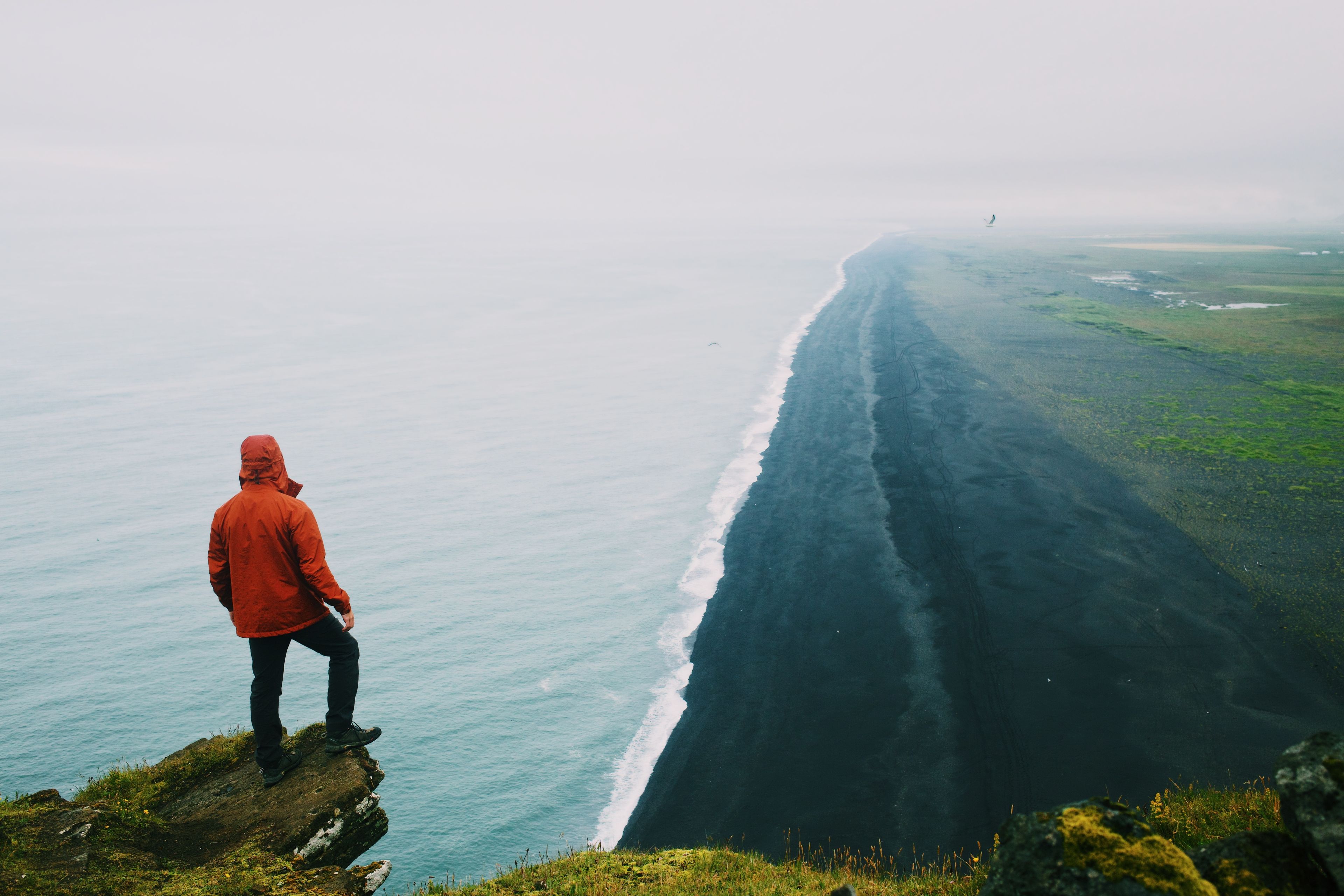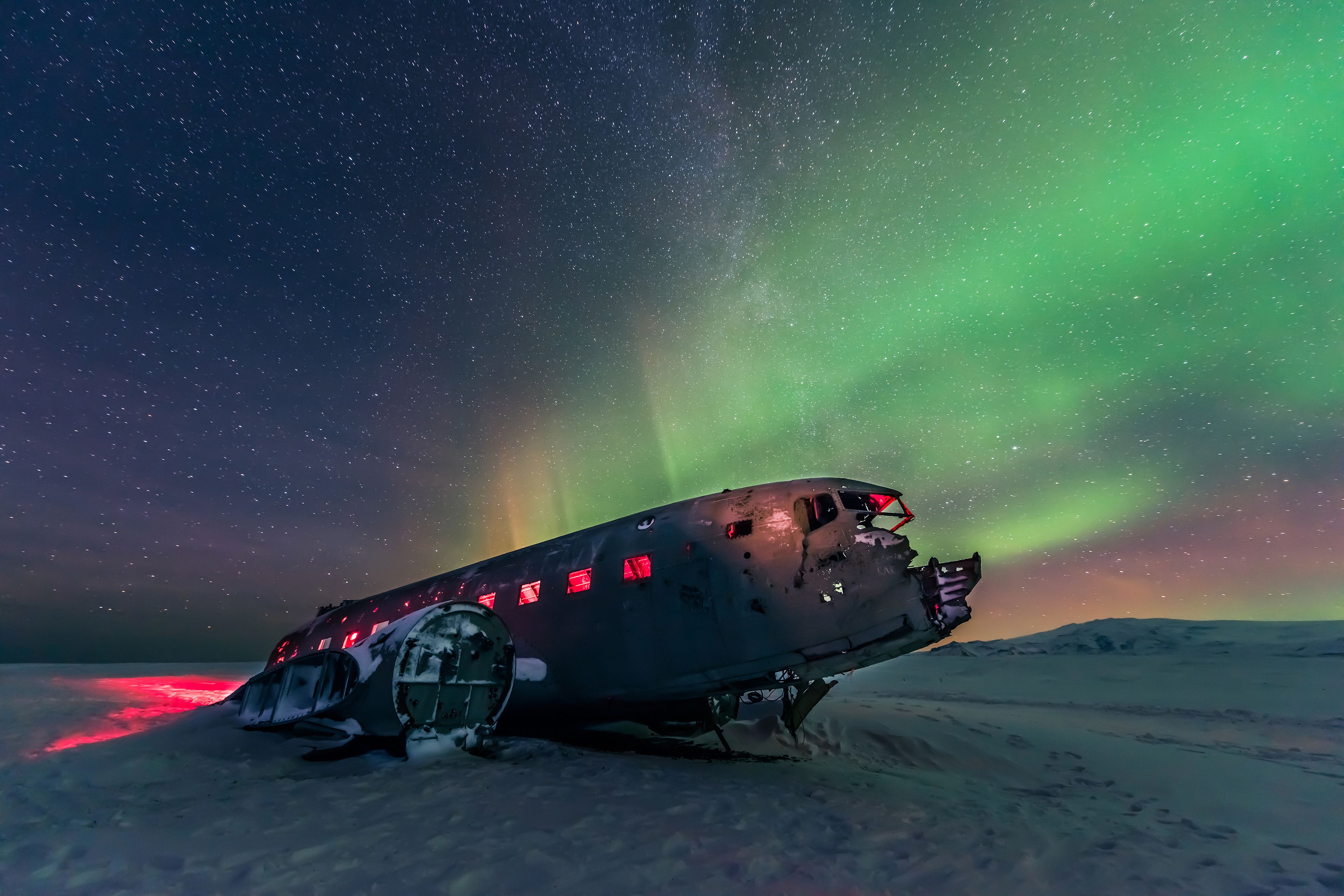
Marvel at Nature: Exploring Dyrholaey in Iceland
Jump to chapter
Nestled in South island is a special place you have to see for yourself, the Dyrhólaey Peninsula. Dyrhólaey translates to “Door Hill Island” as it once was a volcanic island before it joined the mainland and became a nature preserve. The area has two parts you can explore, an upper and a lower. We will go over how to get there, what to see and so much more. Here is your guide to the breathtaking Dyrholaey Peninsula.
What's Dyrhólaey?
Dyrhólaey is a 120-meter-high promontory on Iceland's south coast, near the village of Vík. It was created over 100,000 years ago by volcanic eruptions. The name means "door hill island" because of its huge rock arch. The arch was shaped by the ocean and is big enough for boats to pass through. In 1993, a pilot even flew a small plane through it. The western side, called Háey, is made of tuff and basalt from underwater eruptions, while the eastern side, Lágey, has pillow lava and columnar basalt, showing its volcanic history.
At the top is the Dyrhólaey Lighthouse, built in 1927. It helps guide ships and has amazing views. From here, you can see the Reynisdrangar sea stacks, black sand beaches, and the Mýrdalsjökull glacier. Many seabirds, including puffins, nest on the cliffs from May to early August. Some parts may close during nesting season to protect the birds, so it’s good to check before visiting.

Where is Dyrholaey Peninsula?
Dyrhólaey, formerly known by sailors as Cape Portland, is on Iceland's south coast. It is relatively close to the village of Vik and is a 2-hour and 30-minute drive south of Reykjavik.
The Dyrhólaey Peninsula is accessible right off the Ring Road, making it a convenient stop during your road trip. You will drive down Ring Road or Route 1 east, before taking a right onto road 218. You will take this road to the end before deciding which turn you want to make. To visit lower Dyrholaey, keep driving straight down the road. If you want to explore the upper area first, then make a right up the hill. We recommend going up first and then exploring the lower section on the way down.
If you do make a right up the hill you will be able to drive to the top. Then, on your back down, you will take 218 back out, allowing you to spend some time at the beach. But we will get to all of the amazing places you can visit here shortly!
When To Visit Dyrholaey
You can truly visit Dyrholaey during any season, and it is popular all year round. However, there are a few things you should know before adventuring. Spring and summer is nesting season on Dyrholaey, so certain areas will be closed.
This is not planned and truly depends on when the birds decide to visit the rocky area. During this time, the lower part of Dyrholaey is still open to vehicles. The upper part is closed to vehicles but is normally open to hikers during the day. This is also an amazing time to see the adorable Puffin up close.
Winter is another beautiful time of year to visit despite the cold. You can enjoy the beach covered in snow in contrast to the black sand. Just be sure to pack the right clothing and dress super warm. Who knows, you may even catch a glimpse of the Northern Lights.

Puffins At Dyrholaey
Puffins in Iceland are found in the North Atlantic Ocean, Iceland being home to over eight million of them! You can have a chance to spot them throughout the country during the late spring and summer months. Luckily, Dyrholaey is one of the top places to see them in Southern Iceland, too. Take a short walk to the Dyrhólaey Viewpoint, which will give you an amazing view of the whole area. Puffins are typically spotted around this location.
During the summer months, you will have a greater chance of seeing puffins. They lay their nests in April and then usually stay until early September. It is known that they are more commonly spotted between May to the middle of August, as this is the main puffin season in Iceland. They lay their nests on the cliffs and then return to the ocean after breeding.
At Dyrholaey, you will be viewing the Puffins from a distance. Make sure to pack your binoculars so you can get up close and personal view. Sometimes they do venture to the top of the cliff as well, so always be mindful when exploring the area.
Top Attractions At Dyrholaey
There are so many majestic attractions at Dyrholaey. Here are our top picks and yes, we recommend doing them all!
Dyrhólaey Lighthouse
Marvel at the Dyrholaey Lighthouse which has been sitting at the top of the cliff since 1927. This very old lighthouse is the only housing option on top of the cliffs. Old lighthouse keepers used to stay there overnight when working. All you can hear is the waves crashing beneath you, a very serene atmosphere.
While the lighthouse is closed to the public, Travelers had a chance to stay in the lighthouse at one point, thanks to a stopover campaign that took place back in 2015. They have not done it since but we hope they do it again in the future!
Getting to the lighthouse is easy, just take a short walk from the upper parking lot.

Views From Loftsalahellir Cave
Do not miss your opportunity to visit the Loftsalahellir Cave! Which will be on the left side of the road when heading into the peninsula. It is a very small cave that packs a beautiful view from the inside. You will be able to see views of Reynisfjara Black Sand Beach as well as the arch through the cave hole. This is in addition to the large field of grass that showcases a bright green color.
This cave is historic too. It was once used by the farmers of Mydalur as an assembly place, mostly to shield them from harsh weather. Today you will find photographers flocking here to get that bucket list photograph.

The Arch With The Hole
One of the most popular attractions at Dyrholaey is the infamous Stone Arch. Also known as “The Arch With The Hole”. Since Dyrhólaey means "the hill island with the door hole" it is no wonder that it is named after this area. The black lava arch is located in the middle of the peninsula and is 393 feet high or 120 meters high. You can walk along the arch, above the hole, on the narrow bridge. Do not try this if you are afraid of heights though, there is nothing on each side so go at your own risk.
The arch was formed by the sea rising, combined with the force of the waves. Eventually, the waves kept aggressively hitting the middle, which caused it to break off. After a long while, the hole was formed. It is so big that you can even spot boats passing through it, but only when the waves are calm.
The best place to view Stone Arch is from the upper parking lot. Once you park, follow the short path that brings you around the lighthouse. Your jaw will drop when you see ‘The Arch With The Hole” in person as it is a natural phenomenon. To the north of you, you can see the Mýrdalsjökull glacier and to the east, you can spot the sea stacks of Reynisdrangar.

Dyrhólaey Beach
The beach here can be overlooked since it sits across from the famous Reynisfjara black sand beach in Vik. But Drholaley beach, also known as “The Endless Beach” is equally as beautiful thanks to its impressive black sand and green grassy plain behind it. This is an addition to the gorgeous mountains that sit way in the distance.
How did these black sand beaches even get here? The main reason you can find black sand beaches in Iceland is due to the volcanic activity of the island. The black sediment was once created by boiling lava. This came from the nearby dormant volcanoes, which are volcanoes that have not erupted in a long time but are expected to erupt again in the future. The hot lava would cascade down the beach before eventually cooling off and becoming solid. When cold hits a very hot surface it can cause the hot surface to break apart. Then forming small volcanic rocks also known as black sand or small pebbles.

The Danger Of Black Sand Beaches
Yes, they can be dangerous and unpredictable. This is mostly due to the alarming sneaker waves that truly come out of nowhere. While normally you can see big waves in the distance at the beach, sneaker waves are the opposite. They hit further up the shore and have nothing to do with weather or wind speed. This means there is no warning that they are coming at all.
In addition to the waves, Iceland’s ocean is also known to have strong offshore currents. That combined with the freezing cold water is why you won’t find any swimming beaches in the country. A strong current with a sneaker wave can have a fatal outcome for someone who gets caught in it.
Most of the fatalities happened at Reynisfjara beach, which is close by. If you do decide to visit the famous Renfishara beach just be mindful and never turn away from the water. The same rules should also apply at Dyrholaey.
Things To Do Near Dyrholaey
Dyrholaey is very close to all the attractions along Iceland's South Coast. If you're coming from Reykjavik, I recommend you to stop in these places before getting to Dyrholaey.
Vík Swimming Pool
Take a dip at Vik Swimming Pool! For a cheap cost of 900 kr. or $6, you can spend some lounging out in the Icelandic Sun. This is a great way to cool off during the summer months after a long day of hiking. If you are visiting in the winter time you can still visit! Take advantage of their hot tubs and sauna.
The pool is open every day, just be sure to check the website for their hours. If you are feeling brave, take a frigid plunge in their plunge pool which sits at 4-6°C or 30-24°F.
Reynisfjara Beach
You should definitely add Reynisfjara Beach to your list. Especially since you can see it from upper Dyrholaey. The picturesque black sand pairs well with the ocean and rocky sea stacks. It is rumored that the sea stacks were formed by two trolls who attempted to drag a ship to land. They were then turned into the remarkable basalt sea stacks which rise from the ocean.
Reynisfjara Black Sand Beach can be enjoyed any time of the year too. The beach is so prevalent that National Geographic even rated it one of the Top 10 Non-Tropical Beaches to Visit On The Planet in 1991. Besides, it is only a twenty-minute drive away from Dyrholaey!

Abandoned DC Plane on Sólheimasandur
Heading back west from Dyrholaey towards Reyjavik is the historic abandoned DC Plane on Sólheimasandur. In1973, the DC plane had a crash landing on the black sand beach of Sólheimasandur. Fortunately, everyone on the plane survived and was later helicoptered to safety. Now you can visit the shell of the plane by taking a 2-and-a-half-mile one-way hike to the wreckage site. It is truly a sight to see and is located only seventeen minutes from Dyrholaey.

FAQ :
Can you walk from Reynisfjara Beach to Dyrholaey?
No, you cannot walk from one beach to another since they do not connect. However, you can see the Reynisfjara beach from the Dyrholaey. You would have to drive to Vik to see Reynisfjara beach
Can you drive to Dyrholaey lighthouse?
If you do have a 4×4 vehicle, you can take the road to the lighthouse. If you don't have a 4×4, you can drive to the parking lot and then hike to the lighthouse.
Where are black sand beaches in Iceland?
They are everywhere! With their vibrant sand and landscapes, we understand why you want to spot them. Want to know where to find them? Read our Guide to Black Sand Beaches of Iceland.
Conclusion
Dyrhólaey is an unforgettable stop on Iceland’s South Coast. With stunning views from the lighthouse, nesting puffins on the cliffs, and black sand beaches below, there’s plenty to see. It’s easy to reach and well worth a visit. Just check for seasonal closures, dress for the weather, and take your time exploring this incredible place.
Frequently Asked Questions About Dyrhólaey
Latest Blog Posts
 Places to Visit
Places to VisitGrótta Lighthouse: A Magical Place Near Reykjavik
Iceland has plenty of cool spots to visit, but some of the best ones fly under the radar. Grótta Lighthouse is one of these hidden gems – a charming lighthouse on a tiny tidal island with amazing views, lots of birds, and one of the best places near Reykjavík to see the Northern Lights. Unlike the busy tourist hotspots, Grótta lets you experience Iceland's raw nature just minutes from the capital. Here's the catch: You can only reach it at low tide, which makes getting there part of the adventure. Let's look at everything you need to know to plan a great visit to this coastal treasure.
 Canyons
CanyonsÁsbyrgi Canyon in Iceland: A Horseshoe-Shaped Wonder
Tucked away in northeast Iceland sits Ásbyrgi Canyon, a natural wonder that looks like it jumped out of a fantasy book. When I visited in 2023, my friends and I had the place almost to ourselves – just us and one other family exploring this huge horseshoe-shaped canyon. After a short 20-minute walk, we reached a peaceful pond nestled at the base of tall cliffs. It was quiet. Surprisingly quiet. If you're planning an Iceland trip and want to escape the crowds while seeing something truly special, Ásbyrgi Canyon should be on your list. Let's dive into everything you need to know about this hidden gem.
 Volcanoes
VolcanoesAskja: Iceland’s Remote Volcanic Wonderland
If you're the kind of traveler who loves a bit of adventure, Askja should be on your radar. This rugged, otherworldly volcanic caldera is about as remote as it gets in Iceland. No tourist crowds, no paved roads, just raw nature, steaming craters, and eerie, moon-like landscapes. Sounds epic, right? Well, it is. But getting there is no small feat. You’ll need a proper 4x4, some serious road trip spirit, and a good sense of adventure. But trust me, it’s worth it. If you’ve ever wanted to feel like you’re exploring another planet, this is the place to go.